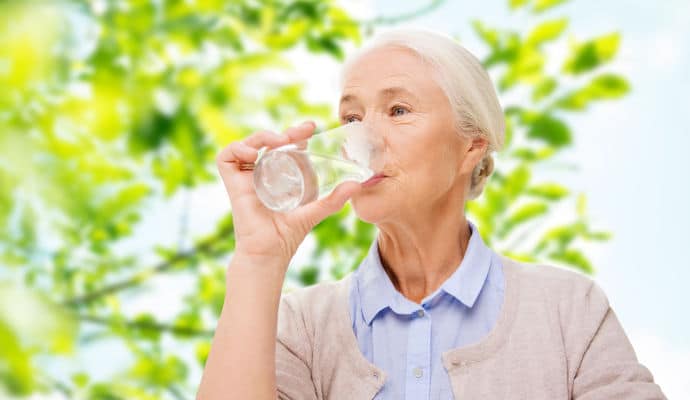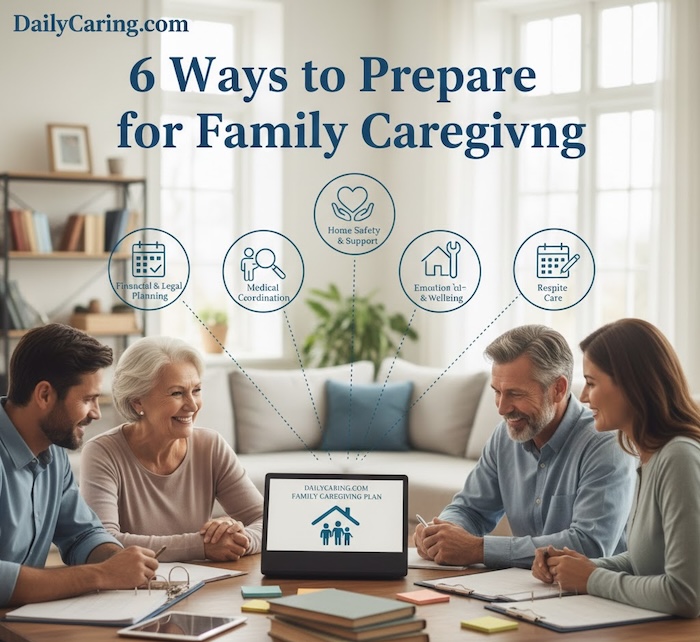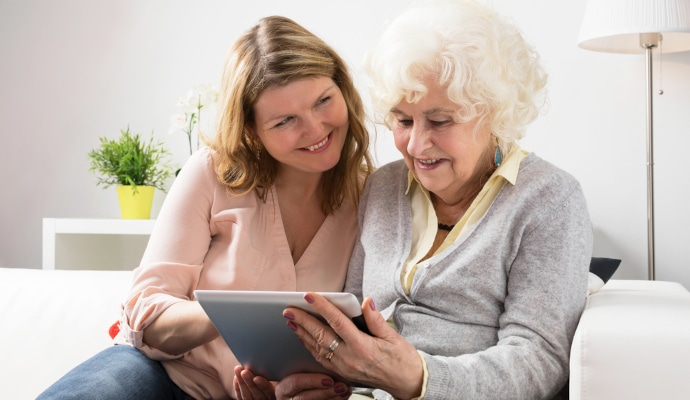Staying hydrated is crucial for seniors’ health, affecting everything from energy levels to kidney function. Still, many older adults struggle to drink enough water due to reduced thirst cues, mobility issues, or simply forgetting. Caregivers often find themselves pleading, “Just one more sip!” without success.
These six creative strategies—from flavorful infused waters to smart hydration reminders — make hydration easier (and enjoyable) for seniors. Discover how minor tweaks can prevent dehydration while respecting your loved one’s preferences and independence.

Dehydration is a Common Challenge for Seniors
Preventing dehydration is essential because it can cause serious health issues and is a common cause of hospitalization in people over age 65.
Proper hydration is also needed for certain medications to work.
Ideally, we’d be able to prevent seniors from getting dehydrated, but it’s tough to increase someone’s fluid intake when they won’t cooperate.
To help you keep an older adult hydrated, we share six creative tips for getting seniors to drink more water.
Use These Hydration Ideas as a Starting Point
Each person has different habits, preferences, and health conditions, so it’s essential to be creative and try different ideas until you find ones that work for your older adult.
You must also check with their doctor if you have questions about how a creative technique could affect their health.
For example, you wouldn’t want to give high-sodium drinks to someone with high blood pressure, milkshakes to someone with high cholesterol, or sugary beverages to a diabetic.

6 Strategies to Get Seniors to Drink More Water
1. Remember that there are many sources of fluids
People don’t have to drink only plain water to get hydrated. Coffee, tea, fruit juice, sweetened beverages, fruits, and vegetables all contain water.
Suppose dehydration is a serious issue for your older adult, but they really resist drinking healthy fluids. In that case, it may be necessary to make trade-offs, such as allowing them to consume less healthy options like sugary drinks or diet soda.
To be sure that the pros outweigh the cons and their overall health will benefit, speak with their doctor. first
Or, try serving more foods with high water content to increase hydration without drinking fluids.
2. Keep water close by at all times
Sometimes, making it easy for seniors to serve themselves could encourage them to drink more water.
Try keeping a lightweight water pitcher and a cup near their favorite seat to make it quick and convenient to take a drink.
3. Experiment with beverages at different temperatures
Your loved one may prefer hot drinks to cold, or vice versa. Experiment to find out which type they like better.
Try different things like warming up juices, making decaf iced coffee with cream, or adding plain soda water to make tea or juice bubbly.
VIDEO: How to Encourage Seniors to Stay Hydrated
4. Try something savory
Those who like savory foods may enjoy drinking hot soup broth instead of a sweet or neutral-tasting beverage.
The broth could come from a can, box, or powder for convenience. It’s especially comforting in cold weather.
And if your loved one is watching their sodium intake, make sure to get a low-sodium broth or consider making homemade broth.
5. Make popsicles
Homemade popsicles made from fruit juice or a mix of juice and water are a great treat and way to get more fluids into your older adult.
6. Offer smoothies, milkshakes, Ensure, sports drinks
Some stubborn older adults may resist drinking fluids.
If so, you could try enticing them with smoothies, milkshakes, Ensure, or sports drinks, even if they’re not the healthiest choices.
If they like the flavor or texture of these options, they may be more willing to drink them regularly.
Recommended for you:
- Dehydration in Seniors: An Often-Overlooked Health Risk
- 3 Top Benefits of a Daily Routine for Seniors
- 7 Steps to Take When Aging Parents Need Help
About the Author

Connie is the founder of DailyCaring.com and was a hands-on caregiver for her grandmother for 20 years. (Grandma made it to 101 years old!) She knows how challenging, overwhelming, and all-consuming caring for an older adult can be. She also understands the importance of support, especially in the form of practical solutions, valuable resources, and self-care tips.














My mom is 95, has dementia and a hiatal hernia. She has been hospitalized a couple times in the past month due to her hernia and UTI. We have to be very careful with what we feed her. One thing that has helped is we set an alarm every two hours to retrain her bladder. When her iPad goes off she knows it’s time to go sit on the toilet. A straw definitely helps with liquid. I’ve taken all pills out of her reach and actually put them in her mouth when she takes them. If I hand them to her she sometimes drops them on the way to her mouth, or I’ll find them on the floor.
Thanks for sharing your experience and these great tips! It’s wonderful that you’ve found solutions that work well for your mom.
I know Elderly love to see food that is colorful look and taste good.
Meals on wheels forget that some time.
Indeed, a nice presentation is always helpful.
It’s worth adding that it can be useful to offer a drinking straw with any cool drinks. My 95 year old mother is in the later stages of dementia and finds it difficult to drink at all, but she manages better when I give her a straw.
I also make her (and the rest of our family of 7 – four generations) super nutritious smoothies – with strawberries, blueberries, grapes, apple, pear, banana, pineapple, mango, broccoli stem, carrot, parsley, kale, ginger, turmeric root & black pepper, a pinch of mineral-rich himalayan salt, brazil nuts for selenium, and sometimes supplemented with vitamin D3, zinc and vitamin C or other medicinal herbs. When blending, I use fresh pressed juice to thin the smoothie down to milkshake consistency. The strongest flavours come from the strawberries and pineapple, so despite the colour of the smoothies, they taste very nice. Even though she only sips other drinks, my mother actually guzzles these smoothies down when using a straw. It’s as if, even in her demented state, her body knows it needs these nutrients.
Thank you for sharing these recipe ideas!
Thanks for sharing beautiful ideas which are helpful a lot for seniors. These ideas really makes sense.
So glad this article is helpful!
e83 yr old mother, doesn’t drink enough fluids, is a glass of gatorade everyday ok ?
It’s best to ask your mother’s doctor if it’s safe for her to regularly drink sports drinks. For some older adults, sports drinks could be harmful to their bodies.
Elizabeth,
Many seniors really like creamed spinach. If your mom does that would be a way to get healthy dark greens into her.
Meals on wheels is a low cost option that has helped me on days I don’t have someone else to help with my grandma who has some dementia. The chat a few moments, provide a hot meal, and are sure she is up and about. Contact your local senior center – lots of free resources available. Don’t be afraid to be specific when friends offer to help – like “can you stop by mom’s on Wednesday and hand her her pills with some ensure?”
Excellent suggestions! Thank you for sharing 🙂
Yes, Meals on Wheels is a very good option … as long as they eat everything that is delivered to them. For example, when my Mom and Step-father were receiving Meals on Wheels, he wouldn’t eat his vegetables, they got tired of the number of times they had the same meat in a week, not enough variety of foods, and they didn’t drink the milk (Skim or 1%) because “they drink regular milk”! So, yes, it’s a very good, healthy option for seniors, but it doesn’t do them any good if they don’t eat/drink it all. 🙁
It’s unfortunate that your mom and step-father didn’t enjoy their meals more, but it’s good that they had the opportunity to eat healthy meals that were delivered to them.
Smoothies are extremely beneficial. I use kefir, which is not only high in probiotics but also does not negatively affect people with lactose intolerance. I put all of my mother’s supplements in them, so she doesn’t have to swallow a bunch of pills. She loves the tast of them. Frozen bananas make them creamy and delicious.
Thanks for sharing your suggestions!
Major point by Dr. Kernisan. My wife, 76, without speech due to small strokes, got very dehydrated,in part because of a UTI, which made her not want to drink.
The trap for a caregiver is to chalk up inadequate drinking to ‘oh, she’s getting old and forgets’ or other mental impairment. My own experience was that, no there is a physical situation or medical condition they’re responding to. The response may be inchoate, and perhaps they don’t want to tell about their discomfort. But a UTI, or incontinence, or difficulty getting to the toilet—the ones doctor cited—may well be the problem.
Great points, thank you for sharing your and your wife’s experience. It’s important to investigate and understand the reasons someone may not want to drink beverages to stay hydrated.
1000% right. Chronic or undetected UTIs cause huge problems for seniors, including delirium which is often mistaken for dementia – even in a hospital’s age care ward where you would think it would be more quickly picked up. If the person has a sensory disability like hearing or sight loss they are at even greater risk of getting delirium. The longer that goes undiagnosed and untreated the more permanent harm it can do.